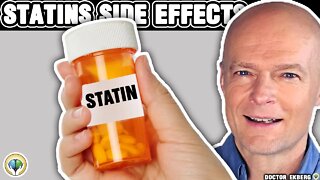Effects of Acid Suppressing Proton Pump Inhibitors(PPIs) on the Body – Dr. Berg
Proton-pump inhibitors(PPIs) are powerful antacids and one of the most widely sold drugs in the world. Find out about the side effects of these popular drugs.
0:00 Introduction: What is a proton-pump inhibitor?
0:18 PPI and stomach acid
0:52 Side effects of proton-pump inhibitors
3:08 Side effects of low stomach acid
3:43 How to increase stomach acid
4:25 Avoiding the use of a PPI and its effects
4:37 Thanks for watching!
In this video, we’re going to take a look at proton-pump inhibitors, also known as PPIs. PPIs are the most potent inhibitors of stomach acid production. They work by blocking the pump in your stomach that releases hydrochloric acid.
Proton-pump inhibitors are one of the most popular drugs in the world. They are used to treat conditions like acid reflux, GERD, gastritis, and stomach ulcers.
Proton-pump inhibitor use does not come without side effects. Here are some of the unwanted side effects that come along with PPIs:
•Headache
•Nausea
•Diarrhea
•Abdominal Pain
•Gas
•Anxiety
•Dizziness
•Fatigue
•Bone Fractures
•Muscle Damage
•Increased risk of the following health problems: dementia, kidney disease, C-Diff, SIBO, fungus, candida, polyps, colitis, and hypochlorhydria(low stomach acid).
Additional symptoms caused by hypochlorhydria(low stomach acid) include the following:
• Anemia
• Decreased vitamin B12
• Decreased absorption of vitamin C, B, and K
• Increased risk of infection
• Overgrowth of bacteria
• Increased risk of carcinoma in stomach
To increase your stomach acid, try drinking 2 tablespoons of apple cider vinegar mixed in a glass of water, with each meal. If you don’t like the taste, try adding stevia.
Betaine hydrochloride is a natural acidifier that can also be used, especially if you need something a bit stronger. The only time you wouldn't want to use these acidifiers is if you have an ulcer.
Instead of using a PPI to deal with GERD and acid reflux, the best thing to do is address your diet.
Dr. Eric Berg DC Bio:
Dr. Berg, age 57, is a chiropractor who specializes in Healthy Ketosis & Intermittent Fasting. He is the author of the best-selling book The Healthy Keto Plan, and is the Director of Dr. Berg Nutritionals. He no longer practices, but focuses on health education through social media.
Follow Me On Social Media:
Facebook: https://bit.ly/FB-DrBerg
Instagram: https://bit.ly/IG-DrBerg
Anchor: https://bit.ly/Anchor-DrBerg
TikTok: https://bit.ly/TikTok-DrBerg
Send a Message to his team: https://m.me/DrEricBerg
ABOUT DR. BERG: https://www.drberg.com/dr-eric-berg/bio
Disclaimer:
Dr. Eric Berg received his Doctor of Chiropractic degree from Palmer College of Chiropractic in 1988. His use of “doctor” or “Dr.” in relation to himself solely refers to that degree. Dr. Berg is a licensed chiropractor in Virginia, California, and Louisiana, but he no longer practices chiropractic in any state and does not see patients so he can focus on educating people as a full time activity, yet he maintains an active license. This video is for general informational purposes only. It should not be used to self-diagnose and it is not a substitute for a medical exam, cure, treatment, diagnosis, and prescription or recommendation. It does not create a doctor-patient relationship between Dr. Berg and you. You should not make any change in your health regimen or diet before first consulting a physician and obtaining a medical exam, diagnosis, and recommendation. Always seek the advice of a physician or other qualified health provider with any questions you may have regarding a medical condition.
#keto #ketodiet #weightloss #ketolifestyle
Thanks for watching. I hope you’ll try dietary changes to avoid the negative effects of proton-pump inhibitors. I’ll see you in the next video.
-
 3:15
3:15
Dr. Eric Berg
6 years agoSide Effects of Purified Bile Salts – Dr. Berg
82 -
 3:22
3:22
Dr. Eric Berg
6 years ago10 Side Effects of TUMS Antacid (Calcium Carbonate) – Dr. Berg
43 -
 7:21
7:21
Dr. Sten Ekberg
6 years agoThe Dangers Of Statins & The Side Effects
9321 -
 34:11
34:11
drtimharrigan
10 months agoThe CBD Research you Didn't Know About!
9 -
 1:01:13
1:01:13
GenerationHealth
2 months agoEp 051 - Side Effects May Include...
26 -
![Vitamin B1 (Thiamine) Deficiency- The 'Great Imitator' of other Illnesses [Mirrored]](https://hugh.cdn.rumble.cloud/s/fw/s8/6/C/z/U/c/CzUci.0kob.jpg) 16:33
16:33
Do Not Be Deceived
1 year agoVitamin B1 (Thiamine) Deficiency- The 'Great Imitator' of other Illnesses [Mirrored]
2473 -
 28:54
28:54
drtimharrigan
10 months agoResearch/Facts: UNDER PRESSURE, Cholesterol, Statins, Drugs, Chiropractic, Blood Pressure!
33 -
![[2023-07-17] The Shocking Effects of Going Caffeine-free for a Month](https://hugh.cdn.rumble.cloud/s/s8/6/c/L/Y/b/cLYbl.0kob.jpg) 9:50
9:50
ninjaman1994
10 months ago[2023-07-17] The Shocking Effects of Going Caffeine-free for a Month
2261 -
 5:21
5:21
DrNickZyrowski
4 years agoSigns You Have Low Stomach Acid - What It Means & Proven Solutions | Dr. Nick Z.
48 -
![Butcher's Broom Extract Supplement [Dosage & Side Effects]](https://hugh.cdn.rumble.cloud/s/s8/1/L/b/F/m/LbFmk.0kob-small-Butchers-Broom-Extract-Supp.jpg) 0:37
0:37
Dr. Tom Biernacki
1 year ago $0.01 earnedButcher's Broom Extract Supplement [Dosage & Side Effects]
118